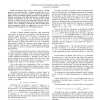Free Online Productivity Tools
i2Speak
i2Symbol
i2OCR
iTex2Img
iWeb2Print
iWeb2Shot
i2Type
iPdf2Split
iPdf2Merge
i2Bopomofo
i2Arabic
i2Style
i2Image
i2PDF
iLatex2Rtf
Sci2ools
ATAL
2015
Springer
2015
Springer
Global Approximations for Principal Agent Theory
—Principal Agent Theory (PAT) seeks to identify incentives and sanctions that a consumer should offer a producer as part of a contract in order to maximise the former’s utility. However, identifying optimal contracts in large systems is difficult, particularly when little information is available about producer competencies. In this work we propose that a global contract be used to govern such interactions, derived from the properties of a representative agent. After describing how such a contract can be obtained, we analyse the contract utility space and its properties. Finally, we suggest how our work can be integrated with existing work on multi-agent systems.
Related Content
| Added | 16 Apr 2016 |
| Updated | 16 Apr 2016 |
| Type | Journal |
| Year | 2015 |
| Where | ATAL |
| Authors | Federico Cerutti, Nir Oren, Christopher Burnett |
Comments (0)

